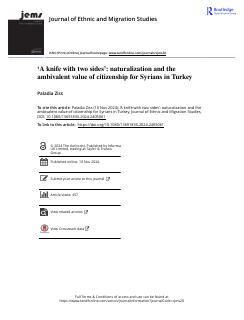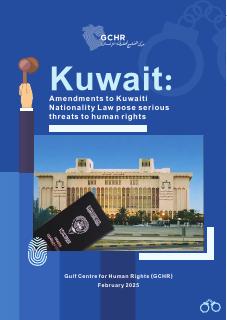“My children are treated like foreigners despite living and being born in Bahrain.”
Rahima, a Bahraini woman who cannot pass on her nationality
KEY ISSUES
- Statelessness is a highly prevalent problem in the MENA, but is poorly mapped and global statelessness data underrepresents the scale of the issue.
- Many stateless people can trace the origins of their exclusion back to the formation of states, with the dissolution of the Ottoman Empire and then the end of colonisation. The children and grandchildren of those who were excluded remain stateless today because nationality is generally acquired by descent (jus sanguinis).
- Discrimination in law and in practice further entrenches the intergenerational statelessness of large population groups such as the Kurds, Palestinians, and Bidoon.
- Gender discrimination is prevalent in the nationality laws of states in the MENA: half of the 24 countries globally that still discriminate against women in the conferral of nationality on their children can be found in the region.
- Nationality deprivation is used by several countries, particularly in the Gulf region, as a tool for the oppression and exclusion of political opponents and human rights activists.
- Very few states in the MENA are parties to the Statelessness Conventions and while there is a reasonably high accession rate to core UN human rights conventions, some maintain reservations to key provisions that protect the right to a nationality.
OVERVIEW OF STATELESSNESS IN THE MENA
Statelessness is a highly prevalent issue across the Middle East and North Africa (MENA). Many people are stateless in the region today because their ancestors were left without citizenship as a result of state formation processes and the (re)drawing of borders in the region – with exclusion affecting subsequent generations because nationality is generally acquired by descent (jus sanguinis). In other cases, statelessness is the product of targeted deprivation of nationality, gender discriminatory nationality laws, gaps in (the implementation of) safeguards to prevent childhood statelessness, and problems with accessing documentation – in particular in the context of conflict and forced displacement.
Statelessness is poorly mapped in the MENA, and no reliable data is available in most countries, even those that are known to be home to significant stateless populations. This is partly due to the diversity of the groups affected and the underlying causes, as well as the high political sensitivity of questions of demography and citizenship in many countries. While the official Arabic term for a stateless person is adeem al-jansiya, meaning “lacking nationality”, in everyday speech, stateless people across the region use various terms to refer to themselves, further fragmenting the experiences of statelessness in the MENA.
UNHCR’s 2023 statistics indicate that there are 323,546 recorded stateless people in the region, remaining relatively unchanged from previous years. These figures significantly underrepresent the actual size of the stateless population in the region. Data is not reported for all countries (e.g. Algeria, Bahrain, Morocco, Oman, Tunisia, and Yemen are not represented in global statistics), Palestinians under UNRWA mandate are not included in UNHCR’s global data on statelessness, nor are figures available for other forcibly displaced stateless populations in the region. Other large populations affected by statelessness are not, or not fully, accounted for in existing statistics. These include Kurds in Syria, Iraq, and in smaller numbers in Lebanon; and Bidoon (or Bidun/Bedun, from bedun jinsiya, meaning “without nationality”) in Kuwait, Saudi Arabia, the UAE, and Iraq. Some estimates also place the number of Rohingya refugees from Myanmar who are residing in Saudi Arabia as high as 250,000 (which would make Saudi Arabia one of the largest hosting nations for Rohingya alongside Bangladesh and Pakistan), yet UNHCR only reports a figure of 70,000 stateless people in the country. Conflict and instability in the region has displaced millions of people and created new risks for the emergence of statelessness, which data is also unable to account for.
STATE FORMATION AND DECOLONISATION
Various historical factors have contributed to the prevalence of statelessness in the region today. Many stateless people can trace the origins of their exclusion back to the formation of states, which mostly occurred with the dissolution of the Ottoman Empire and, later, the end of colonisation. When borders were (re)drawn, the new states needed to define who their citizens were and some people were left out. For example, the genesis of statelessness for the Bidoon population in Kuwait, was the failure to comprehensively identify and register everyone who should have been recognised as citizens during the post-British protectorate period of state formation. When the 1959 Kuwaiti Nationality Law was implemented, access to Kuwaiti nationality was largely restricted in practice to those who lived in the walled Kuwait City. The government now classes this community as “illegal residents” and has imposed severe restrictions on rights and access to services since the mid-1980s. Similarly, in Lebanon, a census that took place in the 1930s after the establishment of the state “locked in” those who were entitled to nationality (and the delicate religious balance of the state), and left others out. Since the Kuwaiti and Lebanese citizenship systems, like those of the other countries in the region, are based on jus sanguinis, statelessness is an intergenerational problem that today also affects the children, grandchildren and great-grandchildren of people who historically were denied nationality.
Numerous Arab nations have incorporated legal clauses that specifically promote access to citizenship for individuals with Arab or Muslim ancestry. These provisions have their origins in both the post-World War II pan-Arab movement and the earlier transitional clauses concerning nationality laws outlined in the Sèvres and Lausanne treaties that followed the disintegration of the Ottoman Empire. However, Palestinians are excluded from naturalisation in many countries in the region, following the “Casablanca Protocol” which provides a basis for access to rights and services, but not citizenship. This is a contributing factor to the fact that many Palestinians live in an intergenerational and protracted state of statelessness.
GENDER DISCRIMINATION
The MENA region has the highest concentration of gender discriminatory nationality laws. Nationality laws in 24 countries around the world prevent women from passing nationality to their children on an equal basis with men, and half of them are in the MENA region. In Kuwait, Lebanon and Qatar, mothers are not allowed to confer nationality on their children. However, in Kuwait it is possible to do so by decree issued by the Minister of the Interior if the father is unknown or not legally established, and in Lebanon by permission of Head of State after acquiring foreign nationality and reapplying for Lebanese nationality within one year of the child reaching the age of majority, if living in Lebanon. In Bahrain, Iran, Jordan, Libya, Oman, Saudi Arabia, Sudan, Syrian Arab Republic, and United Arab Emirates, mothers are allowed to confer nationality on their children only under certain circumstances, for example, if the father is unknown or of unknown nationality; the father has not acknowledged the child; the father is stateless; paternity is not established; or through a discretionary procedure to confer nationality by application. In Iraq and Mauritania, mothers are not allowed to confer nationality to children on an equal basis with fathers in cases where the child is born outside the country. Moreover, in Egypt, Iraq, Kuwait, and Oman, if the father’s nationality changes, children may cease to be citizens without consideration of the mother’s nationality.
The MENA region also constitutes a significant proportion of countries around the world where laws prevent women from passing nationality to their spouse on an equal basis with men. In Bahrain, Jordan, Kuwait, Lebanon, Libya, Morocco, Qatar, Saudi Arabia, Syrian Arab Republic, United Arab Emirates and Yemen, there is no provision to allow married women to pass nationality to foreign spouses. In Iran, Iraq, Mauritania and Oman, a foreign husband can apply for naturalisation under normal procedures, with some reduced or waived conditions. Algeria is the only country in the region with nationality laws that uphold comprehensive gender equality, including women's right to confer nationality to their children and to a noncitizen spouse (provided that they are Muslim), on an equal basis with men.
DEPRIVATION OF NATIONALITY
Deprivation of nationality has been widely instrumentalised in the MENA region, at different times, leaving those affected stateless. Mauritania, Iraq, and Syria are three countries in the region that in the second half of the 20th century arbitrarily deprived large numbers of people of their nationality on grounds of race and ethnicity. For example, in Syria, a one-day census was carried out in the Al-Hasakah province in 1962, the pretext being that many non-Syrian Kurds had crossed illegally from Turkey and it was necessary to review people’s status. To be eligible for the census, residents were required to prove that they had lived in Syria since 1945, meaning that anyone not able to provide evidence of this was, in effect, systematically deprived of their nationality. This led to tens of thousands of people, mainly affected Kurds, but also some Arabs and Christians, being rendered stateless. While some gained citizenship through a Decree passed in 2011, it is estimated that over 150,000 people remain without citizenship.
In the 21st century, there has been a rise in the deprivation of nationality of individuals. Since 2000, one in five countries globally have expanded legislative powers or added new grounds for nationality deprivation that relate to disloyalty, national security or counter-terrorism. In relative terms, the MENA region saw the highest prevalence of such reforms – 44% of countries in the region saw an expansion of deprivation powers. Eight countries amended their laws in the period between 2000 and 2022: Algeria, Bahrain, Libya, Morocco, Oman, Qatar, Saudi Arabia and United Arab Emirates.
In practice, deprivation of nationality is commonly used as a tool of political control, to exclude people from membership and to silence opposition voices. This has manifested as an emerging pattern of human rights activists being stripped of citizenship, especially in the Gulf region – Bahrain in particular, where hundreds of people were targeted – but there have been cases in other countries as well, such as in Egypt. This practice often goes unchecked because in many countries across the region, nationality disputes are not considered to fall under the jurisdiction of national courts, and therefore any arbitrary denial or deprivation cannot be legally challenged.
Other groups at risk of statelessness in the MENA region are those whose citizenship is denied or revoked for national security reasons. These include individuals who are associated with ISIS, children born in ISIS-controlled areas, and so-called ‘foreign fighters’ originating from outside the MENA region. This includes cases in which a citizen is formally deprived of their nationality without sufficient scrutiny as to whether another nationality is held, as well as situations in which states fail to recognise the birth certificates issued by non-state armed groups to children of ‘foreign fighters’ born in ISIS-controlled territory in Iraq and Syria, leaving them unable to establish nationality.
CHILDHOOD STATELESSNESS
Intergenerational statelessness is a significant issue in the MENA region, because citizenship is generally conferred by descent (jus sanguinis) and most countries lack safeguards to ensure that a stateless child born on the territory can access nationality. Even where such safeguards do exist, or where they are available for children in particular circumstances – such as children of unknown parents – they are not widely implemented. In those countries where the law provides for access to nationality through the father only, the risk of childhood statelessness and the prevalence of inherited statelessness is heightened: even if the mother is a citizen, this does not entitle the child to nationality.
According to the 2022 United Nations Population Fund report, all MENA countries provide for compulsory birth and death registration. However, having such laws in place does not guarantee that people will report or register births. Certain groups face particular challenges in accessing civil registration, which can leave children without proof of parentage and place of birth. Children born out of wedlock, for example, are often not legally recognised, and in most countries in the region valid marriage certificates are required to register the births of children. Migrant and refugee parents also face difficulties in registering births, which may put their children at risk of statelessness. Children born to refugees and displaced people are particularly at risk of statelessness as a result of a combination of lost documents and lack of birth registration. Since only fathers can confer their citizenship in many countries, an absent father can also preclude registration and recognition of the legal ties to the home country, which may leave a child stateless.
REGIONAL STANDARDS AND COMMITMENTS
The Arab Charter on Human Rights and the Covenant on the Rights of the Child in Islam both affirm the right to a nationality. However, these are not binding frameworks and there is no human rights mechanism or regional court to monitor implementation or to hear individual complaints under these treaties. Countries in the region do have a reasonably high accession rate to a number of the core UN human rights conventions that protect the right to a nationality, although some maintain reservations to key provisions, such as Article 9 of CEDAW. Regional engagement and progress in respect of international commitments relating specifically to statelessness remains relatively low, as compared to other parts of the world.
The League of Arab states (LAS), a regional consortium of Arab states, has shown some interest in statelessness-related issues. In 2018, the LAS developed a ministerial declaration to strengthen rights to legal identity, including nationality, family unity and birth registration. The declaration also calls for gender equal nationality laws in all LAS Member states, as well as respecting children’s right to a legal identity. Additionally, in May 2021, the LAS, in partnership with UNHCR, convened a meeting of government and civil society representatives to develop an Action Plan to implement the Arab Declaration on Belonging and Legal Identity, calling on all Arab League members to enact reforms to uphold gender equality in nationality laws and every child’s right to legal identity. Of Arab League member states, only Algeria and Djibouti uphold women’s right to confer nationality on their children and spouse on an equal basis with men. The meeting also presented a Regional Toolkit on Nationality Legislation, an instrument that provides an overview of the most favourable provisions on nationality in line with international standards.
Only two countries in the region, Libya and Tunisia, have acceded to both the 1954 and the 1961 Statelessness Conventions; while Algeria and Israel are state parties to only the 1954 Convention. Mauritania made a pledge at UNHCR’s High Level Segment on Statelessness in October 2019 to accede to the 1961 Convention (the only country from the region to make any statelessness pledge), but this remains unimplemented. Indeed, the level of accessions in the region has not changed for many years and with the majority of the states not having ratified the 1951 Refugee Convention either, there is little expectation that more accessions will be achieved.
[Last updated January 2024]
Cover image by Damir Babacic
Voices & Experiences
-
Human rights violations faced by stateless people in Bahrain
![Bahrain]()
Human rights violations faced by stateless people in Bahrain
![Bahrain]()
“The vast majority became instantly stateless with no alternative citizenship [due to citizenship stripping]. The consequences of such a decision affected us in all avenues of our life. A ban on travel was imposed, many were sacked from their previous jobs. We were no longer able to use the public services, which meant there was no health care, no housing and unemployment benefits or social allowances, or allowed to claim for any citizenship benefits. Even new-borns of the stripped citizens were as well barred from claiming the Bahrain citizenship, […]”
Jawaad Fairooz
Chairman of SALAM for Democracy and Human Rights
Voice from https://salam-dhr.org/bahrain-stripping-of-nationality-a-weapon-for-political-suppression-2/
-
Statelessness in Syria
![Syria]()
Statelessness in Syria
![Syria]()
“Before the 1962 special census, my grandfather, father and uncle were Syrian citizens. However, the census stripped them of their nationality and rendered them maktoumeen”.
Feisal Jamal, a stateless Kurd
In 1962, the Syrian government conducted a special census in al-Hasakah province, northeastern Syria, where Kurds form a majority. Following this, many Syrian Kurds lost their citizenship and were divided into two groups: Ajanib al-Hasakah (foreigners), registered stateless individuals given red cards for identification, and Maktumeen, unregistered stateless individuals who received identification certificates (ICs).
Voice from https://stj-sy.org/wp-content/uploads/2022/10/Statelessness-in-Syria_An-Enduring-Dilemma.pdf
-
Gender discrimination in Lebanon’s nationality laws
![Lebanon 1]()
Gender discrimination in Lebanon’s nationality laws
![Lebanon 1]()
Nawal, a Lebanese citizen, married to a Frenchman, said her son Ziad “tried to apply for jobs after graduating, but they wouldn’t take him because he’d be an additional expense to them.”
Nawal
Lebanese citizen
Lebanon is one of 24 countries globally that discriminate against women in relation to the conferral of nationality to their children: the primary mode by which children in Lebanon acquire nationality is still through the father only. Women cannot transfer their nationality to their spouses either. This causes many challenges for day-to-day life, in accessing basic rights due to the lack of Lebanese nationality.
Voice from https://nclw.gov.lb/wp-content/uploads/2022/09/2021_Nationality-not-Naturalization_Eng.pdf
Latest Resources: MENA
-

‘A knife with two sides’: naturalization and the ambivalent value of citizenship for Syrians in Turkey
Type of Resource: Academic publication
Theme: Discrimination
Region: Middle East and North Africa
View -

Amendments to Kuwaiti Nationality Law pose serious threats to human rights
Type of Resource: Report
Theme: Nationality Deprivation
Region: Middle East and North Africa
View -

Podcast: Being Stateless: An Oral History Podcast
Type of Resource: Podcast
Theme: Legal / Digital Identity
Region: Asia / Pacific
View



